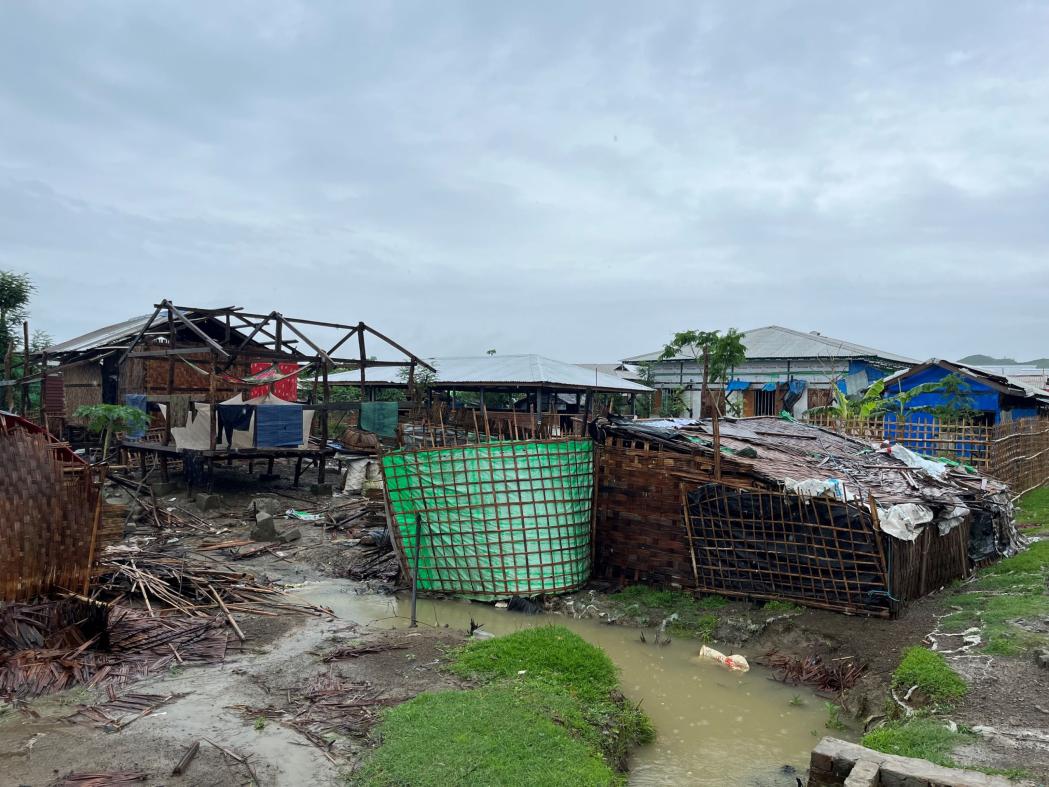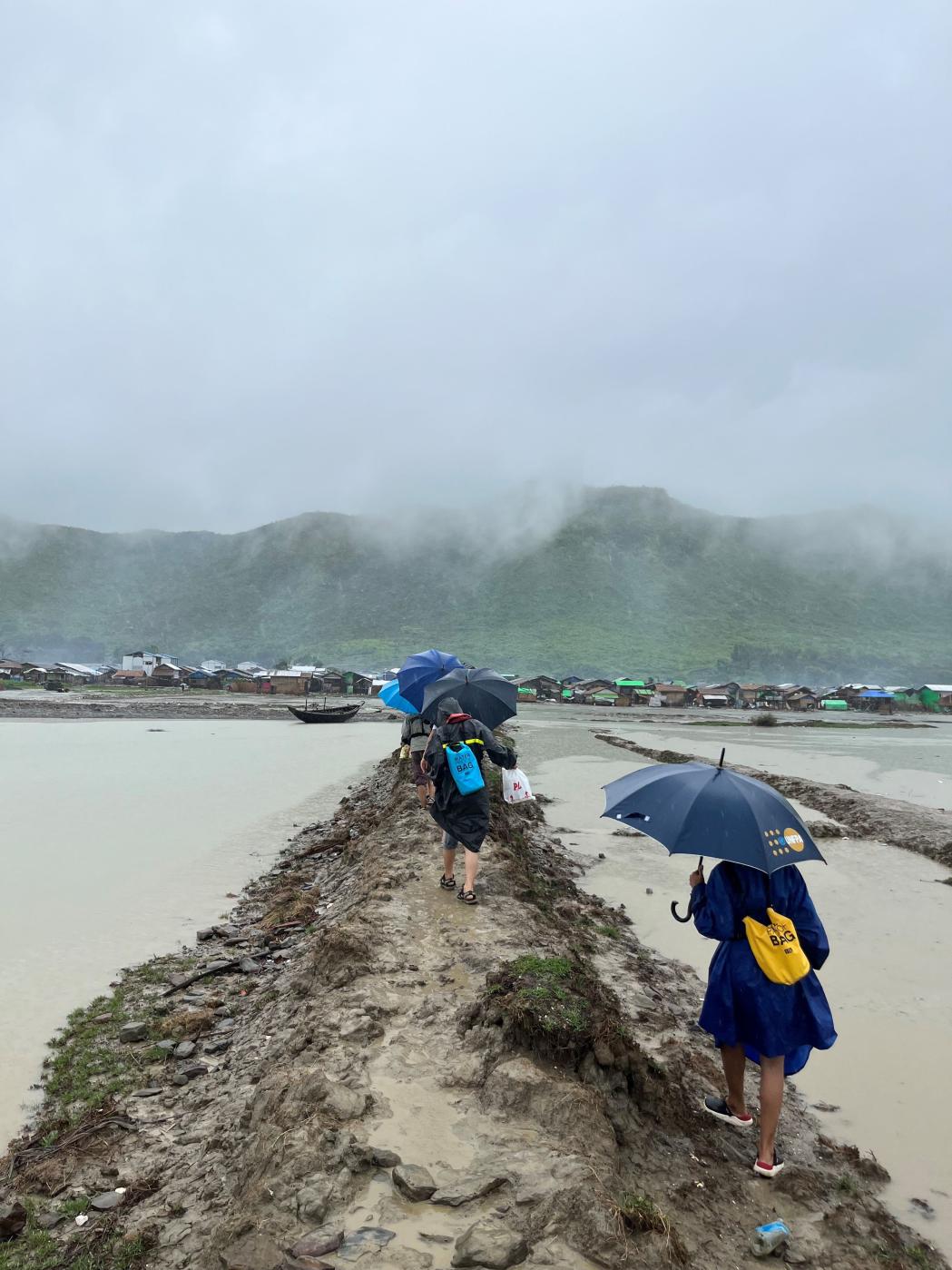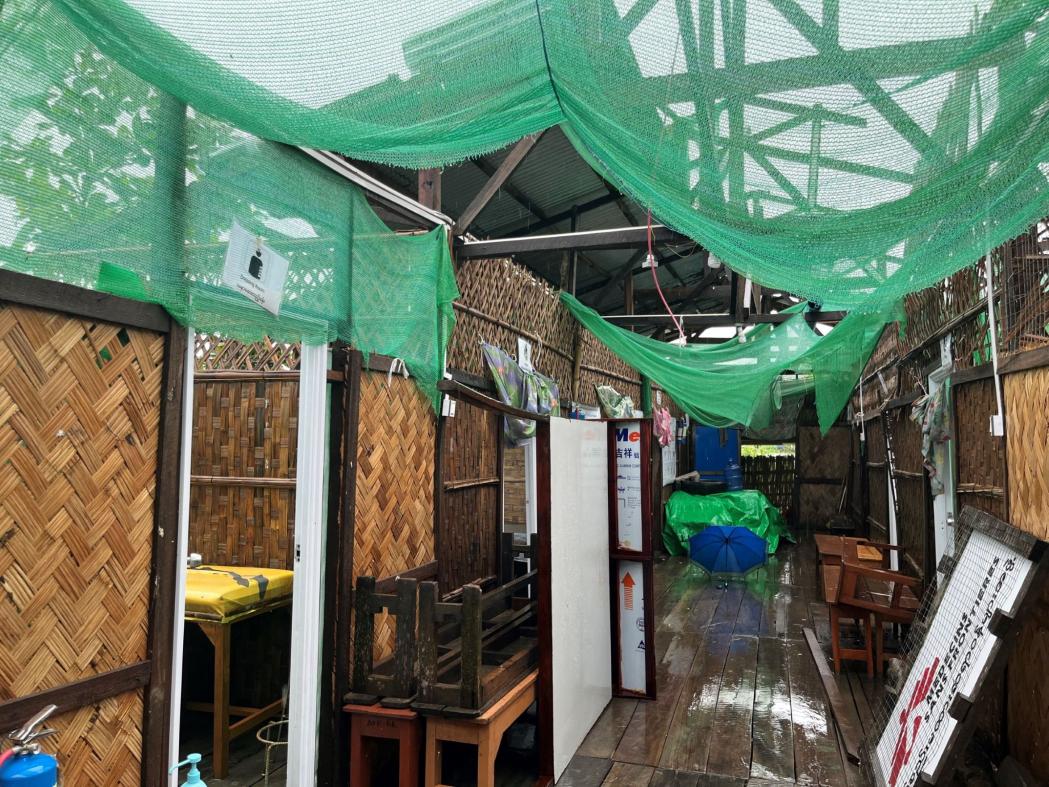Myanmar: Monsoon season increases challenges for delivery of mobile clinics

A Nout Ye camp, pictured in June, more than a month after Cyclone Mocha. © MSF
The rain was loud. Conversations were dulled by the sound. Despite the heavy rain, today I was joining the team running one of the weekly mobile primary health care clinics in Pauktaw where Rohingya and other displaced populations have been contained with insufficient shelters and poor water and sanitation facilities since 2012.
Doctors Without Borders / Médecins Sans Frontières (MSF) has four clinic locations on this island – three weekly mobile clinic sites and another clinic site opening every weekday – for both camp residents and the host community members, it normally carries out about 3,000 consultations per month.
After braving the torrential rain to load supplies into the truck from the Doctors Without Borders Sittwe office in Rakhine, Myanmar, we drove to the jetty, where Doctors Without Borders boats were ready for the day’s movements. Everyone, including doctors, nurses, dispensers and a health promotion officer, naturally formed a line between the truck and the boat to hand over boxes to the next person. The rain was still heavy, and some colleagues were holding umbrellas for each other until the boxes were safely loaded onto the boat.
The journey to Pauktaw should take less than an hour, but on the way, all humanitarian organizations previously needed to stop at navy checkpoints and show travel related documents. Until recently, this could often take up to three hours, meaning that, due to tidal schedules, clinic time would be drastically reduced. Recent developments, however, have led to a much shorter wait at the checkpoint, leading to extended clinic time and more consultations for patients.
The team finally left the jetty in Sittwe and headed to Pauktaw with deafening sounds of the boat through the waves. Over the heavy rain and foggy weather, crowded bamboo structures started appearing. It was already 11am. Our clinical administrator stood before us and stressed that we should get back to the boat by 2pm to avoid the rising tide and to safely get back to Sittwe. This meant we only had two hours for the clinic.
Upon leaving the main boat, we were supposed to jump to smaller wooden boats waiting to take us to the island. I carefully stepped my feet onto the wooden boat and sat next to one colleague who tried to hold an umbrella for me, but I was already completely wet from top to bottom.
We landed at the wide mud flat that was wetter than usual due to the heavy rain. Doctors Without Borders community health workers (CHWs) and other volunteers were already waiting for us to help move the boxes. I took my steps one by one at a ridiculously slow speed.

Doctors Without Borders staff members walk the difficult path into the camps. © MSF
Phyo (pseudonym), my close colleague in the humanitarian affairs team, guided me to a broken structure near the compound. It was the Doctors Without Borders clinic building with proper rooms for consultations, dressings and health promotion activities. Now half of the roof has gone due to Cyclone Mocha and the structure looked like an abandoned facility. We would need new resources and time to fix it and could not promise when or how. Instead, we went to where a big white tent was being used as a makeshift clinic. Patients were already gathering around the area.
Pregnant women, patients with skin diseases, and children with diarrhea had been waiting to see Doctors Without Borders for a week, but sometimes they need to wait even longer if bad weather conditions, including strong wind and heavy rain, stop the clinic’s movement by sea. The main health concerns of this community are skin diseases, acute watery diarrhea and respiratory problems that are closely related to poor living conditions and hygiene issues. The camp also has a high number of sexual and gender-based violence survivors, including domestic and intimate partner violence, that contribute more than 30% of the total cases in A Nout Ye camp in the past 12 months.

The Doctors Without Borders clinic building, still badly damaged from Cyclone Mocha. © MSF
The physical environment of this particular camp is considered to be the worst among the camp locations in Pauktaw. It is on the paddy field that is not suitable for housing structures and public latrines are not sufficiently managed. On top of these preexisting harsh conditions, the people in this camp have been affected by Cyclone Mocha in May and are still struggling with damaged shelters and lack of materials to repair these structures.
In addition, all Rohingya in Pauktaw, and further in Rakhine are subjected to restrictions on movements, education and livelihoods. This is due to their lack of legal status and documentation. In 1982, Myanmar, then called Burma, passed a law that stripped Rohingya of their citizenship. As a result, they are almost entirely dependent on humanitarian assistance and the impact of the cyclone is aggravating the situation.
Eventually the long lines of patients were getting shorter, and the rain had almost stopped. The time was already nearly 1:30 pm. It was time to repack the boxes and move to the boat quickly. The muddy paths were deterring my steps even more than in the morning. I kept losing my balance, repeatedly fell backward, and forward. It looked so far to get to the wooden boats and I saw one of the boats was already leaving with the team. The other one with boxes was waiting for me, but I was still struggling to stay upright on the mud flat.
The return trip was short, but silent. Everyone looked tired and some, including me, looked completely exhausted. And it was only the beginning of the rainy season in Myanmar.